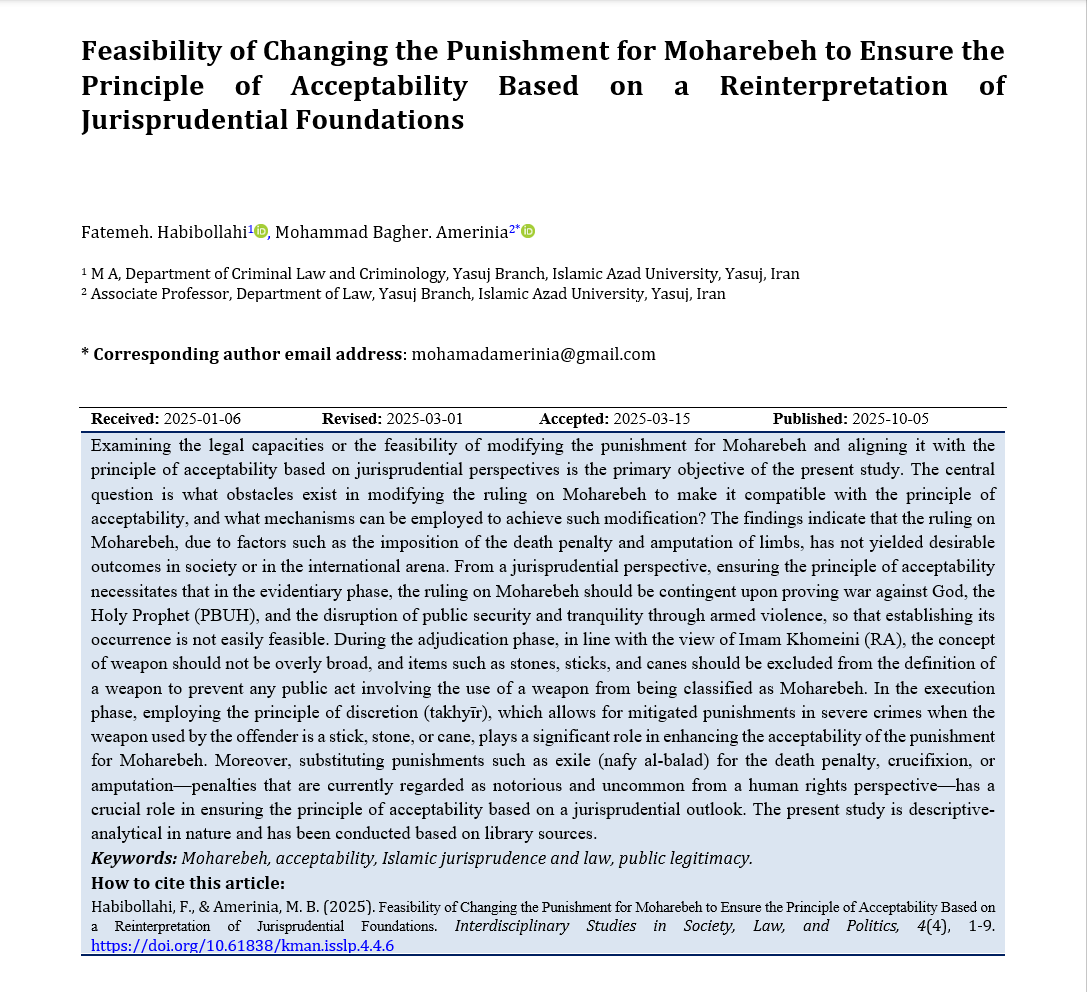Feasibility of Changing the Punishment for Moharebeh to Ensure the Principle of Acceptability Based on a Reinterpretation of Jurisprudential Foundations
Keywords:
Moharebeh, acceptability, Islamic jurisprudence and law, public legitimacyAbstract
Examining the legal capacities or the feasibility of modifying the punishment for Moharebeh and aligning it with the principle of acceptability based on jurisprudential perspectives is the primary objective of the present study. The central question is what obstacles exist in modifying the ruling on Moharebeh to make it compatible with the principle of acceptability, and what mechanisms can be employed to achieve such modification? The findings indicate that the ruling on Moharebeh, due to factors such as the imposition of the death penalty and amputation of limbs, has not yielded desirable outcomes in society or in the international arena. From a jurisprudential perspective, ensuring the principle of acceptability necessitates that in the evidentiary phase, the ruling on Moharebeh should be contingent upon proving war against God, the Holy Prophet (PBUH), and the disruption of public security and tranquility through armed violence, so that establishing its occurrence is not easily feasible. During the adjudication phase, in line with the view of Imam Khomeini (RA), the concept of weapon should not be overly broad, and items such as stones, sticks, and canes should be excluded from the definition of a weapon to prevent any public act involving the use of a weapon from being classified as Moharebeh. In the execution phase, employing the principle of discretion (takhyīr), which allows for mitigated punishments in severe crimes when the weapon used by the offender is a stick, stone, or cane, plays a significant role in enhancing the acceptability of the punishment for Moharebeh. Moreover, substituting punishments such as exile (nafy al-balad) for the death penalty, crucifixion, or amputation—penalties that are currently regarded as notorious and uncommon from a human rights perspective—has a crucial role in ensuring the principle of acceptability based on a jurisprudential outlook. The present study is descriptive-analytical in nature and has been conducted based on library sources.
Downloads
References
Ameli, M. B. M. (2004). Al-Lam'ah al-Dimashqiyyah (Vol. 17). Dar al-Fikr Publications, Qom.
Ameli, Z. B. A. (2002). Masalik al-Afham ila Tanqih Sharaye al-Islam (Translated by A. Mohammadi ed.). Maaref Islamic Publications, Qom.
Danesh Ara, S., & Kazemi, S. S. (2022). The metamorphosis of criminal law in the balance of tradition and modernity; with emphasis on Iranian criminal law. Legal Studies Quarterly, 14(4), 183-211.
Emami Kashani, M. (1993). A study of the jurisprudential theories of the Guardian Council. Rahnamoon Quarterly(4 & 5).
Fadhil Lankarani, M. (2001). Tafsil al-Shari'ah fi Sharh Tahrir al-Wasilah. Center for Jurisprudence of the Imams of the Ahl al-Bayt (AS), Qom.
Goldouzian, I. (2014). Commentary on the Islamic Penal Code. Majd Publications, Tehran.
Habibzadeh, M. J. (1991). A study of the crime of moharebeh and ifsad fil-ard. Kayhan Institute Publications, Tehran.
Hosseini Pasandi, S. S., & Arjomandian, B. (2023). The judicial role in determining appropriate punishment in moharebeh, considering international challenges. Proceedings of the Eighth International and National Conference on Management, Accounting, and Law,
Jafari, M. J., Ghasemi, M., & Torabi, M. (2019). Examination of violations of criminal law principles in the criminalization of baghi and ifsad fil-ard. Journal of Jurisprudence, History, and Civilization, 5(2), 15-24.
Jafari Tabrizi, M. T. (1991). The right to human dignity. Journal of the Faculty of Law and Political Science, 26(1).
Kadivar, M. (2008). Haq al-Nas. Kavir Publications, Tehran.
Malekian, M. (2009). A path to liberation: Essays on rationality and spirituality. Negah-e Mo'aser, Tehran.
Moghimi, A., & Rostami, J. (2019). The extension of moharebeh to maritime piracy from the perspective of Shia jurisprudence and Iranian criminal law. Parliament and Strategy Quarterly, 27(101), 243-269.
Mohibi, J., & Riazat, Z. (2016). Foundations and models of punitive measures (case study in crimes against security). Horizons of Security, 9(33), 33-63.
Momeni, A., & Rostami Najaf Abadi, H. (2015). The role of expediency in the implementation of hudud punishments. Comparative Jurisprudence(5).
Montazeri, H. A. (2009). Islam is the religion of nature. Saye Publications, Tehran.
Montazeri, H. A. (2021). Kitab al-Hudud. Dar al-Fikr, Qom.
Mousavi Bojnourdi, S. M. (2005). Comparative jurisprudence. SAMT Publications, Tehran.
Mousavi Khomeini, R. (2000). Tahrir al-Wasilah. Dar al-Ilm Publications, Qom.
Najafi Abrand Abadi, A. H., Janidi, L., & Niazpour, A. H. (2020). The internationalization of fundamental principles of criminal law.
Najafi, M. H. B. (1981). Jawahir al-Kalam fi Sharaye al-Islam. Dar al-Ahya al-Turath al-Arabi, Beirut.
Nasiri, M. (2024). Evaluating the criminal policy of the Islamic Republic of Iran in the criminalization of moharebeh; foundational and executive challenges. Quarterly Journal of Jurisprudence and Principles, 1-20.
Omidi, J. (2015). Interpretation of the law in criminal law. Mokhatab Publications, Tehran.
Oslon, G. (2014). Narration and Narrative in Legal Discourse. https://www.Ihn.uni-hamburg.dehttps://doi.org/10.1515/9783110316469.371
Qamashi, S. (2012). Human dignity as an obstacle to the expansion of criminalization. Quarterly Journal of Criminal Law Research, 1(1).
Qorashi, S. A. (1992). Qamus al-Quran (Vol. 2). Dar al-Kutub al-Islamiyyah, Tehran.
Universal Declaration of Human Rights. (1948). Universal Declaration of Human Rights.

Downloads
Additional Files
Published
Submitted
Revised
Accepted
Issue
Section
License
Copyright (c) 2025 Fatemeh Habibollahi, Mohammad Bagher Amerinia (Author)

This work is licensed under a Creative Commons Attribution-NonCommercial 4.0 International License.





